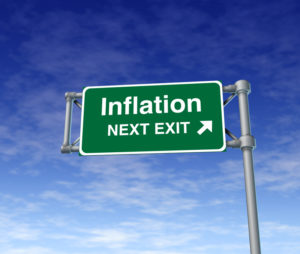
The classic definition of inflation is a general increase in prices and a fall in the purchasing power of money. Standard economic theory teaches us that an over-supply of money will deplete its value and stoke inflation. Western Governments and their Central Banks have issued vast sums of “new” money – inflating their balance sheets like never before. This is particularly true in the US where the Federal Reserve has unleashed trillions in fresh money.
Between 1970-1985 the annual inflation rate in Ireland was in double digits almost every year. In 1975 and 1981 it pushed over 20%. Since 1985, it has consistently been below 5% and in recent years mostly below 2%. So, it’s not hard to understand why many people think that the inflation dragon has been slain.
Consider the following scenario. The pandemic has inflicted grievous pain on most industries. Many companies will not survive and even those that do will find it difficult to return to pre-pandemic norms. The flood of Government money will find its way more and more into the pockets of consumers, who will happily spend it. Increased consumer demand chasing lower levels of factory production and hey presto we have the perfect conditions for inflation. We accept that this is only one possible scenario – human behaviour is much more complex and often defies logic and pigeon-holing. However, MMPI believes in this path.
It seems that others share our views. Just look at the rise in assets that are typically good hedges against spiking inflation. Physical assets like precious metals; industrial commodities, shares in consumer-staple companies, land, etc. are all doing well. If inflationary times are upon us, then holding on to cash will not be profitable. In addition to receiving a nil or negative nominal interest rate, your return in real terms will be ravaged by higher inflation. Is it time for investors to re-adjust their thinking?”
MMPI wrote the above words in a Thought Leadership piece on 14 August last year, 2020. We have no difficulty repeating the message. Higher inflation is now here!
This is a novel phenomenon for many people and how we may react to higher prices cannot be predicted with certainty. For example, in deflationary Japan, consumers have persistently delayed purchases in the knowledge that prices will be lower in the future. This has exacerbated the deflationary trap. In an inflationary environment, will consumers accelerate purchases in the expectation of higher future prices? Nobody knows for sure but the likely behavioural trend will dominate the debate in the months and years ahead.
As we predicted, higher prices are now a given; but for how long? Will the inflationary trap come to dominate the economic agenda? Almost scarily, there is a clear divergence of opinion. Some believe that hyper levels of inflation are on the way and will persist for many years. Central Bankers appear to view higher inflation as transitory only. Which side of the argument are you on? Getting it right will impact your finances!

